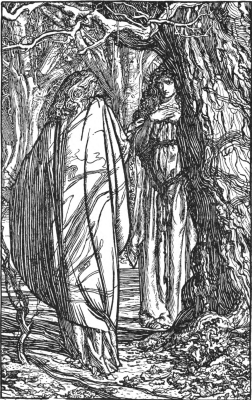Transcriber's Notes:
Page 4 is blank in the original. Ellipses match the original.
Click on the page number to see an image of the page.
[1]
Poetry of the Supernatural

The New York
Public Library
1919
[2]
REPRINTED JUNE 1919
FROM THE
BRANCH LIBRARY NEWS OF MAY 1919
PRINTED AT THE NEW YORK PUBLIC LIBRARY
form p-099 [vi-23-19 5m]
[3]
POETRY OF THE SUPERNATURAL[3:1]
Lafcadio Hearn, in his Interpretations of Literature (one of the mostvaluable and delightful books on literature which has been written inour time), says: "Let me tell you that it would be a mistake to supposethat the stories of the supernatural have had their day in fineliterature. On the contrary, wherever fine literature is being produced,either in poetry or in prose, you will find the supernatural elementvery much alive. . . But without citing other living writers, let meobserve that there is scarcely any really great author in Europeanliterature, old or new, who has not distinguished himself in thetreatment of the supernatural. In English literature, I believe, thereis no exception,—even from the time of the Anglo-Saxon poets toShakespeare, and from Shakespeare to our own day. And this introduces usto the consideration of a general and remarkable fact,—a fact that I donot remember to have seen in any books, but which is of very greatphilosophical importance; there is something ghostly in all great art,whether of literature, music, sculpture, or architecture."
Feeling this, Mr. Walbridge has compiled the following list. It is not abibliography, nor even a "contribution toward" a bibliography, nor a"reading list," in the usual sense, but the intelligent selection of anumber of instances in which poets, major and minor, have turned toghostly themes. If it causes you, reading one of its quotations, to huntfor and read the whole poem, it will have served its purpose. If ittells you of a poem you have never read—and so gives you a newpleasure—or if it reminds you of one you had forgotten, it will havebeen sufficiently useful. But for those who are fond of poetry, and fondof recollecting poems which they have enjoyed, it is believed that thelist is not without interest in itself. Its quotations are taken fromthe whole great range of English poetry, both before and after the timeof him "who made Prospero the magician, and gave him Caliban and Arielas his servants, who heard the Tritons blowing their horns round thecoral reefs of the Enchanted Isle, and the fairies singing to each otherin a wood near Athens, who led the p